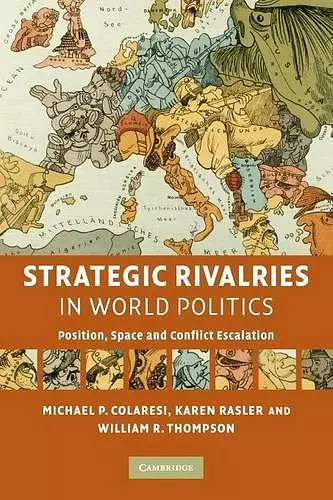Strategic Rivalries in World Politics
Position, Space and Conflict Escalation
William R Thompson author Karen Rasler author Michael P Colaresi author
Format:Paperback
Publisher:Cambridge University Press
Published:10th Jan '08
Currently unavailable, and unfortunately no date known when it will be back
This paperback is available in another edition too:
- Hardback£90.00(9780521881340)

This book examines cases of strategic rivalries and identifies the extent of their effect on international conflict.
Examining the 173 strategic rivalries operating over the past two centuries, Colaresi et al.analyze the nature of rivalries, the differences they make in the probability of conflict escalation and how they interact with serial crises, arms races, alliances and capability advantages.International conflict is neither random nor inexplicable. It is highly structured by antagonisms between a relatively small set of states that regard each other as rivals. Examining the 173 strategic rivalries in operation throughout the nineteenth and twentieth centuries, this book identifies the differences rivalries make in the probability of conflict escalation and analyzes how they interact with serial crises, arms races, alliances and capability advantages. The authors distinguish between rivalries concerning territorial disagreement (space) and rivalries concerning status and influence (position) and show how each leads to markedly different patterns of conflict escalation. They argue that rivals are more likely to engage in international conflict with their antagonists than non-rival pairs of states and conclude with an assessment of whether we can expect democratic peace, economic development and economic interdependence to constrain rivalry-induced conflict.
'Strategic Rivalries in World Politics makes several substantive contributions to our understanding of rivalries. First, the conceptual and empirical distinctions between spatial and positional rivalries are a major contribution to the literature that treats all rivalries as the same. Second, a number of the empirical findings challenge or reinforce past findings about rivalries and thereby extend our knowledge of those phenomena. Yet, the contributions are not confined to the rivalry genre. A nice feature of the book is that the authors use rivalries to gain insights into the validity and utility of some important models and works in international conflict. They demonstrate that considering international conflict in the rivalry context changes or enhances the insights gained from several prominent approaches.' Paul F. Diehl, University of Illinois, Urbana-Champaign
'This book is a theoretically pathbreaking, historically grounded, empirically systematic, and methodologically rigorous analysis of the origins, escalation, and consequences of strategic rivalries. It is essential reading for anyone interested in the underlying sources of international conflict, the dynamics of serial crises, and the multiple paths to conflict escalation and war.' Jack S. Levy, Rutgers University
'This is a book of major importance. It provides new data and new findings that greatly enhance our knowledge of inter-state rivalries, conflict, and war. International Relations scholars and diplomatic historians will find this essential reading.' John A. Vasquez, University of Illinois at Urbana-Champaign
ISBN: 9780521707619
Dimensions: 226mm x 150mm x 20mm
Weight: 520g
330 pages